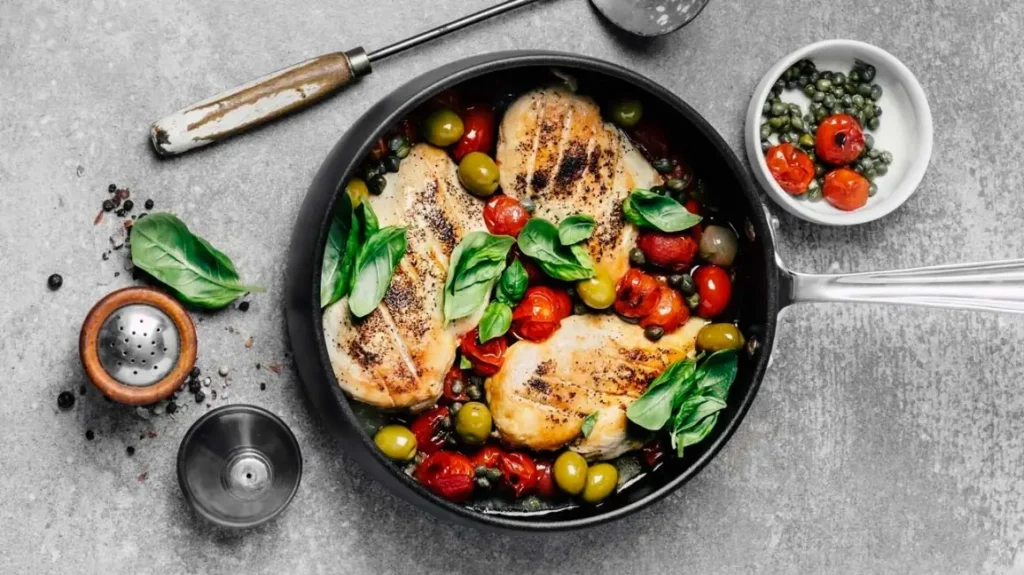
Diet plays a major role in managing leaky gut by influencing gut bacteria, inflammation, and intestinal barrier strength. Choosing nutrient-dense, anti-inflammatory foods supports healing, while processed, sugary, or irritant foods worsen gut permeability and inflammation.
Key Takeaways
- Leaky gut occurs when intestinal permeability increases, allowing toxins and microbes to enter the bloodstream.
- Common causes include poor diet, stress, medications, alcohol, and gut infections.
- Healing foods include bone broth, fermented foods, leafy greens, and omega-3-rich fats.
- Processed foods, refined sugar, gluten, dairy (in sensitive individuals), and alcohol worsen symptoms.
- Gut repair improves with probiotics, fiber, hydration, stress control, and adequate sleep.
- Though not an official medical condition, supporting gut integrity enhances digestion, immunity, and overall health.
What is leaky gut ?
Leaky gut is a term for increased intestinal permeability, where the lining of the intestines becomes more porous than normal and allows bacteria, toxins, or undigested food particles to enter the bloodstream. It’s not an official medical diagnosis, but can occur in certain digestive diseases and is linked to symptoms like bloating and stomach discomfort.
What causes leaky gut?
Leaky gut, or increased intestinal permeability, can be caused by a variety of factors that damage the gut lining, leading to gaps that allow harmful substances to pass into the bloodstream. Some of the primary causes include:
- Poor Diet: Diets high in processed foods, refined sugars, unhealthy fats, and low in fiber can disrupt the balance of gut bacteria and damage the gut lining.
- Chronic Stress: Ongoing stress can lead to an imbalance in gut bacteria and increase gut inflammation, weakening the intestinal barrier.
- Medications: Long-term use of certain medications like nonsteroidal anti-inflammatory drugs (NSAIDs), antibiotics, and corticosteroids can harm the gut lining.
- Alcohol Consumption: Excessive alcohol use can irritate and damage the gut lining, leading to permeability.
- Infections: Gut infections caused by bacteria, viruses, or parasites (such as SIBO or Clostridium difficile) can compromise the intestinal barrier.
- Radiation Therapy: Abdominal radiation can damage the gut lining, increasing permeability.
- Food Sensitivities: Conditions like celiac disease or intolerance to gluten, dairy, and other foods can trigger inflammation and damage the intestinal lining.
- Gut Imbalances (Dysbiosis): An imbalance of gut bacteria, such as an overgrowth of harmful bacteria, can disrupt gut health and permeability.
- Toxins and Environmental Factors: Exposure to toxins, heavy metals, and chemicals (like pesticides and household cleaners) can negatively impact gut health.
- Autoimmune Diseases: In some cases, autoimmune conditions like Crohn’s disease, ulcerative colitis, and others contribute to leaky gut due to immune system dysfunction.
The Best and Worst Foods for Leaky Gut
Supporting gut health through diet is essential for managing symptoms of leaky gut and promoting a strong intestinal barrier. The foods you choose can either nurture your gut lining and microbiome or worsen inflammation and permeability.
Best Foods for Leaky Gut
- Bone Broth
Bone broth is rich in collagen, amino acids like glutamine, and gelatin, which support the repair of the intestinal lining and reduce inflammation. - Fermented Foods
Foods like kimchi, sauerkraut, kefir, and yogurt are packed with probiotics, which help balance the gut microbiome and promote healing. - Leafy Greens
Vegetables like spinach, kale, and collard greens are high in fiber and antioxidants that help reduce inflammation and nourish the gut. - Healthy Fats
Omega-3-rich foods, such as fatty fish (salmon, sardines) and flaxseeds, reduce inflammation and promote gut health. - Bone-Health Supporting Foods
Foods like carrots, sweet potatoes, and squash are high in prebiotic fiber, which feeds beneficial bacteria and supports gut repair. - Ginger and Turmeric
These natural anti-inflammatory spices help reduce gut inflammation and promote healing in the intestinal lining. - Slippery Elm and Marshmallow Root
These herbs are known to soothe the digestive tract and promote healing of the gut lining. - Coconut Products
Coconut oil and coconut milk have antimicrobial properties, which help to fight gut infections and support the healing process.
Leaky Gut-Friendly Meal Plan sample
| Meal | Example |
| Breakfast | Smoothie with spinach, flaxseeds, coconut milk, collagen powder, and berries |
| Lunch | Grilled salmon, roasted broccoli and zucchini, side of sauerkraut |
| Snack | Mixed nuts and seeds, probiotic yogurt |
| Dinner | Bone broth soup (with chicken, carrots, onions), sautéed kale |
| Dessert | Dark chocolate (70%+ cacao) or coconut yogurt with honey |
Worst Foods for Leaky Gut
- Refined Sugars and Processed Foods
Sugary snacks, sodas, and processed foods fuel harmful gut bacteria and yeast, disrupting the balance of the microbiome. - Gluten
Gluten, especially for those with sensitivity or celiac disease, can damage the gut lining and exacerbate leaky gut symptoms. - Dairy (for Some Individuals)
Dairy products can trigger inflammation in people with lactose intolerance or dairy sensitivity, further harming the gut lining. - Fried Foods and Trans Fats
These foods are high in unhealthy fats that contribute to inflammation, disrupting gut health and the gut barrier. - Artificial Sweeteners
Artificial sweeteners like aspartame and sucralose can negatively impact gut bacteria and potentially increase gut permeability. - Alcohol
Excessive alcohol consumption can irritate the gut lining, disrupt the microbiome, and lead to increased permeability. - Caffeine
High amounts of caffeine can irritate the digestive tract and contribute to gut imbalances, especially in sensitive individuals. - Processed Meats
Processed meats like sausages, hot dogs, and bacon contain additives and preservatives that can irritate the gut lining.
Other Ways to Improve Gut Health
- Take a probiotic supplement: Adds beneficial bacteria to your gut, especially if your diet lacks fermented foods.
- Reduce stress: Chronic stress disrupts gut bacteria. Practices like meditation and yoga help support a healthy microbiome.
- Avoid smoking: Smoking increases inflammation in the digestive tract and reduces healthy gut bacteria.
- Get sufficient sleep: Poor sleep affects the balance of gut bacteria and can impair gut barrier function.
- Limit alcohol intake: Excessive alcohol weakens the gut lining and negatively influences the gut microbiome.
Conclusion
Managing leaky gut starts with understanding how diet and lifestyle choices impact your gut lining and microbiome. Choosing nutrient-dense, anti-inflammatory foods can support gut healing, while avoiding processed foods, alcohol, and common gut irritants helps prevent further damage. Complementing your diet with stress reduction, adequate sleep, and probiotics contributes to long-term gut balance. Though leaky gut is not an officially recognized condition, improving gut health benefits digestion, immunity, and overall well-being.
FAQs
What is leaky gut?
Leaky gut refers to increased intestinal permeability, allowing harmful substances to pass into the bloodstream and potentially trigger inflammation.
Is leaky gut a real medical condition?
It’s not officially recognized as a medical diagnosis but is observed in conditions like IBD and celiac disease.
What are the symptoms of leaky gut?
Common symptoms include bloating, fatigue, brain fog, food sensitivities, diarrhea, and skin issues.
What causes leaky gut?
Causes includes poor diet, stress, alcohol, medications, infections, or autoimmune conditions.
Can diet help heal leaky gut?
Yes. A diet rich in whole, unprocessed, anti-inflammatory foods supports gut repair and balances gut bacteria.
Which foods are best for leaky gut?
Bone broth, fermented foods, leafy greens, healthy fats, and omega-3-rich fish are beneficial.
Which foods should be avoided?
Processed foods, refined sugars, gluten, excessive dairy, alcohol, and artificial sweeteners worsen gut permeability.
Are probiotics helpful for leaky gut?
Yes. Probiotics help restore gut microbiome balance, which support gut barrier function.
How is leaky gut diagnosed?
There’s no standard test. Some labs use urine sugar tests or blood biomarkers for indicators of intestinal permeability.
Can leaky gut be cured?
It can often be managed and improved by addressing the root cause and following a gut-supportive lifestyle.
Reference
- Cleveland Clinic: Leaky Gut Syndrome – Symptoms, Diet, Tests & Treatment
- NIH/PubMed: The Leaky Gut—Mechanisms, Measurement and Clinical Implications
- NIH/PubMed: Leaky Gut Syndrome: Myths and Management
- Karger: The Leaky Gut and Human Diseases: “Can’t Fill the Cup if You Don’t Plug the Holes First”
- Canadian Digestive Health Foundation: What is Leaky Gut Syndrome?
- Wikipedia: Leaky gut syndrome
- WebMD: Leaky Gut Syndrome
Dr. Emily Zhang, MD, is a gastroenterologist and integrative medicine specialist with 10 years of clinical experience in digestive health and microbiome science. She completed her medical degree at University of Chicago Pritzker School of Medicine and fellowship at Massachusetts General Hospital. Dr. Zhang specializes in gut-brain interactions, microbiota diversity, and nutrition-driven gut repair. She has contributed to NIH-funded studies on probiotics and authored patient education resources on functional gut disorders.


